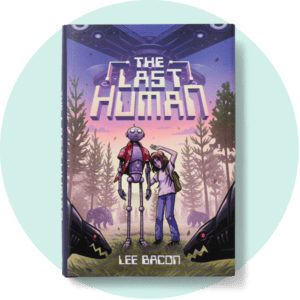Strap on your lab goggles, fire up the robot engines, and grab your magical compass—Literati’s blasting off to the sci-fi universe!
From black holes to robot battles, these Literati kids book club selections will thrill budding scientists. Complex topics, like technological ethics of the future, become approachable (and even fun) with a sprinkle of imagination. Add in a relatable protagonist, and you’ve got every 4th to 6th grader hooked.
Got your seatbelt fastened? Then let’s launch our rockets and explore the best science fiction books for kids ages nine to twelve.

Explorer Academy: The Nebula Secret
Forget book reports—at Explorer Academy, students are graded on their code-cracking, obstacle coursing, and virtual-reality explorations. But for new pupil Cruz, this elite school has a few more challenges up its sleeves.
With solvable puzzles, Explorer Academy: The Nebula Secret is the perfect book for those who need a little brain challenge to stay engaged. Get your young scientist in on the journey, and give them Trudi Truett’s full-throttle adventure.

The Last Human
In robot XR_935’s world, humans are creatures of the past. That is, until the impossible happens: XR discovers a 12-year-old girl—a human girl. Can one human rescue the fate of her entire species? Or is humankind lost for good to its own machinery?
The Last Human is one of the best kids books to stretch imaginations, capturing themes like morality and societal norms. Sprinkles of humor and plenty of action will keep your reader flipping pages like a reading machine!

The Homework Machine
A nerd, a wisecracker, a goody-two-shoes, and a slacker. What could these four possibly have in common?
They all share one secret: the homework machine.
In this cross-clique adventure, the D Squad is on a mission to hide their magical creation (lovingly known as Belch). But as Belch grows in power, the squad races to hide their invention from fellow fifth graders—or worse, their teachers.
In The Homework Machine, it’s a classic humans vs. technology battle. Will the squad be able to control their machine? Or will they lose their special tool… and also their top grades? Your favorite young reader will cackle with every page of this hilarious sci-fi adventure.

George’s Secret Key to the Universe
Who else besides Stephen Hawking could make black holes fun? Strap into your imaginary space shuttle, and soar through George’s Secret Key to the Universe! With the help of a mystical computer, young George and his scientist friends use space-bending portals to explore the great unknown.
Mixing space science with a charming plot, George’s Secret Key to the Universe is the perfect gateway to the cosmos. The combo of Hawking’s deep knowledge and his journalist daughter’s prose keep this book approachable yet utterly fascinating for young astronauts.

EngiNerds
Ken, Dan, and their friends are your typical geek squad, or as they prefer to say, the EngiNerds. Dan has a little surprise for his fellow comrades—the robotic invention, Greeeg.
At first, the Greeeg models are a dream come true, but as Ken discovers, this amateur creation has a few bugs and a gigantic appetite! Now, it’s up to the EngiNerds and their robotic skills to destroy these food-blasting creations. Humor, wit, and good ‘ol nerd appreciation fill every page of EngiNerds. It’s one of the best books for fourth graders to laugh and feel at home among fellow science-lovers.
Our Hypothesis? Your Child Will Love Literati Book Clubs
For budding astronauts and engineers alike, these sci-fi books aren’t just filled with imagination and fun (although there’s lots of that). These books can be a fantastic introduction to STEM concepts and help your reader take interest in different science topics!
Whatever your child is interested in, Literati’s book clubs can bring you the perfect selection—thanks to top-notch curation expertise and a little bit of science. Start with the personalization quiz, and get books picked to match your child’s interests and reading level. Curation adapts as they grow, so no matter your kid’s passion, there’s a read that’ll keep them on the edge of their seats.
Just keep an eye on their experiments going forward, and remind your kid it’s important to program morality into their chore-completing robots!







